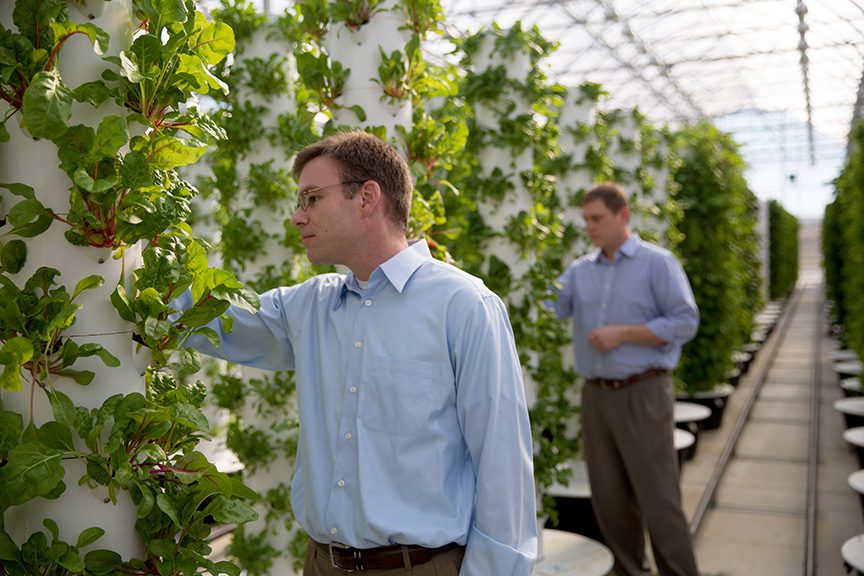
Rob Walenta and John Sulton, co-founders of Scissortail Farms, operate the aeroponic greenhouse farm in south Tulsa. Scissortail Farms provides greens and premade salads to local grocery stores and restaurants.
How is aeroponic farming different from traditional farming?
Aeroponics is a style of hydroponics that uses a mist to supply the nutrient solution rather than a thin film or a pool of water. This style maximizes oxygen availability at the root zones, optimizing growth rates and yields. It also allows for a wide variety of products and the ability to change the product mix rapidly as market conditions vary.
The vertical aeroponic growing system allows for maximum utilization of space and only requires 10 percent of the land that is typically needed for a traditional farm to generate the same amount of production. We can reduce water usage by up to 90 percent when compared with traditional farming. The nutrient water is recycled within the system, so there is only a small loss to evaporation and the plants themselves.
What backgrounds do you and John have in farming?
Our backgrounds in farming began with this venture. While we were working through the design and construction of the facility, we grew plants in 10 towers at our office in an effort to begin learning the process and evaluating which varieties of seeds we felt would be most successful. We used the products that we generated to supply Juniper [a farm-to-table restaurant in Tulsa] with some of their produce and began refining our growing cycles based on the feedback we received.
Do you think aeroponics is the next step in food production?
We think that it is the next step beyond organic farming due to the increased efficiencies in land and water usage, the greater availability of nutrients to the plants and the fact that it is a much cleaner process. Organic and traditional farming methods both utilize biosolids for fertilizer, which can increase the possibility of E. coli infections. We further mitigate E. coli risks by utilizing a municipal water supply and our greenhouse structure helps to prevent intrusion from animals and pests.
Over 90 percent of the produce consumed in the U.S. is grown in the southwest and transported throughout the country via truck or plane. Being local, we are able to get our products to the market more quickly after harvest, and keeping the root ball attached helps to extend the life of the plant. The controlled environment of the greenhouses also protects the plants from adverse weather conditions, providing consistent plant quality, supply and pricing throughout the year.
What challenges do you face with Oklahoma weather?
We still have to make sure that the plants don’t get too cold in the winter or too hot in the summer, that the relative humidity is in the proper range, that there is good airflow, that there is plenty of carbon dioxide and plenty of light. We have controllers that monitor the internal and external conditions and make adjustments like opening the roof vents, running the boiler system and activating the lights.
Does Scissortail Farms have plans to expand?
We’re excited to bring safe, healthy and nutrient rich products to our local market throughout the year, while also creating high quality jobs. We plan to triple the size of our current facility here in Tulsa and then expand to other markets in the region. The expansion here in town will include a section of greenhouse space designed to begin working with flowering plants as well.






















